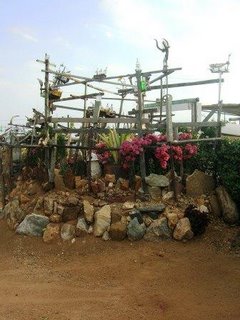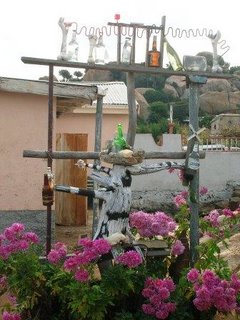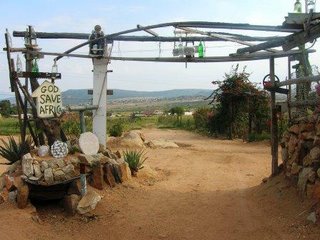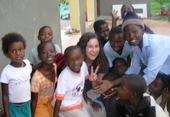Watching Oprah in Africa...
In my naiveté I viewed such happenings as western clothing or music as being the main influence of America. Yet, it goes so much farther than that. I will always be shocked at the infiltration of “American values” into village life. Whereas I am surrounded by people living in poverty; it is shocking to see the influx of materialism that has permeated the conscious of these very same African people. People, who have next to nothing, will buy 150 dollar shoes, and still use a pit toilet or have a roof that leaks. They will buy a full entertainment center, with an exaggerated television, a sound system, and a DVD player, regardless of the fact that they don’t speak English and therefore can only understand a tiny portion of programs on TV a long with the reality that they have no DVD’s to play. In the afternoon, as I watch television in a set up that was nicer than the one my family owned in the U.S., I shake my head at the insanity of it. In my mind I see their priorities as severely misguided as their pit toilet heads toward the point of overflowing and Khutso continues to sleep on a blanket on the floor.
Many of the Africans I know have “things.” My host brothers and sisters wear brand name clothes much more expensive than my own. I may have more clothes than they do but they are far better dressed than I am. It traverses much farther than even this. In the haste to hide the poverty and to equalize themselves with the models they see in magazines and television, western culture in itself is misconstrued. The other day I was riding in a taxi having a conversation with a man about America:
“You are so lucky to be so very rich.”
“I am not rich. I’m only a volunteer. I live in the village just like you and ride in taxis just like you because I don’t have a car.”
“Yes I know but I also know you’re pretending. I know you are very rich: all Americans are.”
“You watch too much TV, not all Americans are rich.”
“Maga (Liar)!!”
“No, seriously, some people in America are very poor. When I was a teacher in America I had students in my class that were homeless.”
This cyclical conversation continued. The man simply could not believe that the streets of America were not paved in gold. This is my frustration, people here have had the idea that all westerners are rich so engrained in their head, that they see me as a walking bank and are embittered when I reject their pleas for money. So the cycle continues. I am annoyed with the dependence of people here on handouts from the West, and they are frustrated with someone they see as a cash cow hoarding away her money and not sharing it with them.
So, in the afternoon, on my family’s large television, I continue to watch the American shows that have overtaken much of the culture that was here before the influence of the West seeped in. Lucky for me, today Oprah is interviewing Dave Chapelle and he is discussing his trip to Africa: once again emphasizing these stereotypes by talking of African poverty and his own fifty million dollar contract. This is going to do nothing for my legitimacy in the village…











